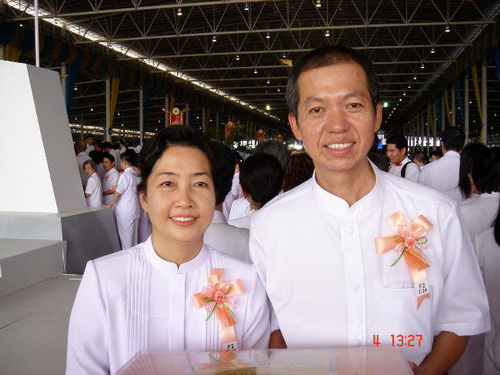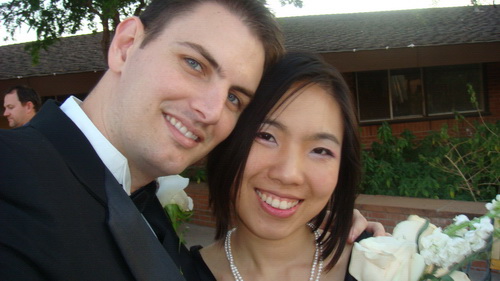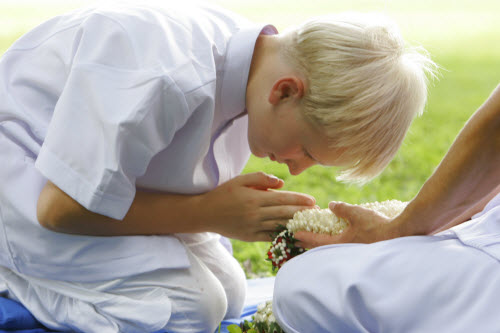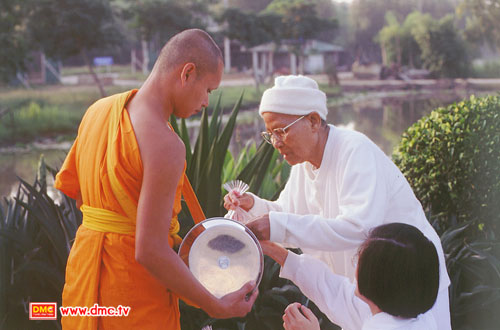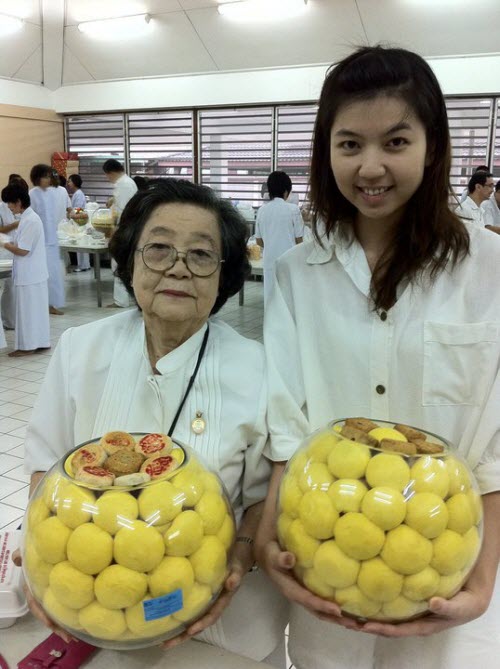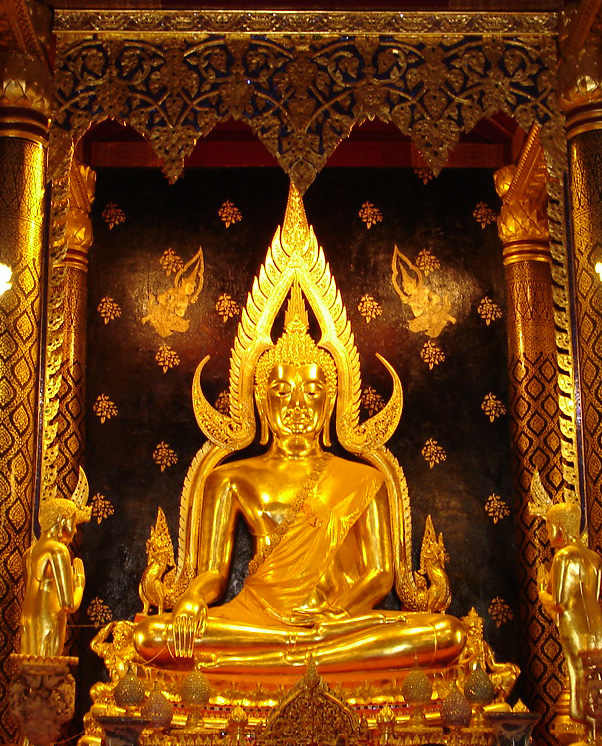Blessing Thirteen:
Cherishing our husband or wifeD. ILLUSTRATIVE EXAMPLES
D.1 Metaphor: Tongue & Teeth in close proximity
When chewing one’s food, if one’s teeth and tongue fail to co-operate, biting one’s tongue can be painful enough to bring tears to the eyes. In the same way, if a husband and wife fail to be helpful and understanding to one another, apart from making no progress in their married life, tears can be expected too in the long-term.D.2 Ex. Love beyond the grave
In the Tang Dynasty an emperor who liked to perform a lot of merits. He had an empress who was not interested in any form of good deeds. Even when their country was invaded, the empress would not make any merit to help the situation. When her husband sent her to make a merit she only pretended to go. When she came back she lied saying that she had already made the merit he sent her to do. The empress died in advance of the emperor. One day when the emperor was sleeping he dreamt he saw the empress as a ghost crying and calling for help. In the morning the king thus called an assembly. He asked the monks what could be done. The monks told him that he needed to make a merit and transfer the merit to the late empress. If the ghost was able to rejoice in the merit then she would escape from her ghostly rebirth for something better. The emperor thus organized a merit-making fit for an emperor. He donated all the gold in his treasury, all the servants, all the carriages, chariots and horses. He transferred merit for the next seven days. He slept again and dreamt that he saw the empress now free from distress, thanking him.The tale of the emperor was therefore told by many generations of Chinese until more recently the whole subject of transferring merit has been misunderstood. Because the normal people don’t have the wealth of an emperor to make merit, they burn paper money, paper Mercedes, paper servants etc. to burn for their deceased relatives. It is tempting to think that nowadays deceased Chinese relatives get only ashes!D.3 Ex. Reluctant marriage: the nun (DhA.iii.147ff.)
There was once a girl who had been going to the temple since the age of seven and had wanted to be a nun right from that time. Her parents didn’t let her, saying that she must finish her studies. Thus as a child she did her duty to her best. When she finished her studies she asked her parents’ permission to become a nun, but they refused saying that they wanted to see her married. Thus she was married and continued to do the best of her duties as a faithful wife. One day the husband was going to take his wife to a fair and said to her ‘go and put on all your best jewelry so that you look the best at the fair’. The wife said, I don’t see the point on putting on any more jewelry than this. The husband asked why not because he had already bought so many nice items of jewelry for her to wear. The wife said that really none of us have any beauty. The skin on our body just hides the putrescence inside ourselves’. The husband teased ‘with that sort of thinking wouldn’t you be better off as a nun?’ The wife replied, ‘actually it is my dearest wish if you would only give your permission.’ The husband allowed her and after becoming a bhikkhuṇi within a very short space of time, she could become enlightened. Whatever duty she had had to do in the past she had always done her best, thus when she was a nun, before long she could achieve what she had set out to do.D.4 Ex. Reluctant marriage: Mahākassapa (Ap.ii.583)
Kassapa was the son of a millionaire. His future wife was also the daughter of a millionaire. Each of them lived in distant cities. The two families had heard the reputation of the other family’s child and before long they sent messengers to arrange the marriage. Neither the bride nor the groom were interested in marriage. When they were both forced to marry then they did not rebel. However, because both of them were more interested in the Dhamma, after they were married they always slept in separate rooms. Later when both of their parents had passed away, they persuaded each other to ordain. The husband became a monk. The wife became a nun. They left their house, gave away all their possessions. When they came to a fork in the road, they agreed that if they went together they might cause gossip so they decided to go their separate ways. Before long both of them met with those who could teach them the Dhamma and both could become arahants with ease.D.5 Ex. Married spite beyond the grave (DhA.i.47ff.)
There was once a good husband and wife. The wife was barren and felt sorry for the childless husband so she found a mistress for him. Both the wife and the mistress were good friends but all of us still have defilements and cannot be trusted. When the mistress got pregnant, the husband was so pleased that he lavished more affection on his mistress than on his wife. This made the wife envious because she thought herself, “even when the child has not yet been born, my husband is already treating me with indifference. If the child is born, the husband will certainly treat me with no more respect than a pig or a chicken around the house.” Thus, she thought ‘time is of the essence’ and found some poison that would cause abortion and tricked the mistress into drinking it. The first child was aborted. When she became pregnant a second time, the wife did the same again. By the third pregnancy, the mistress worked out what was happening and refused to take the ‘medicine’ thus there was a fight between the wife and the mistress. The wife killed the mistress who was almost defenseless because of her pregnancy. When the husband saw what had happened he killed his wife. Before the mistress died she was so vengeful that she made the vow that she would kill and eat all the children of that wife in every future lifetime. When the mistress died she was reborn as a cat in the same house. The wife was born as a chicken in the same house. However many eggs the chicken laid, the cat would eat them all. The chicken was thus angry and before it died made the vow to eat all the children of the cat in the next lifetime. The chicken was reborn as a tiger and the cat was reborn as deer. The tiger ate all the baby deer. This carried on the same until the final lifetime when the wife was born as a man-eating ogress. The mistress was born married to the same husband again. The man-eating ogress ate up the first and second children of the couple. When the third child was born, the mother realized in time and quickly took the child to where the Lord Buddha was staying. As soon as the man-eating ogress followed the mother into the temple, its temptation to eat people disappeared. The Buddha summoned both of the two. The Buddha looked at their previous lives and made the pictures of their past visible for others to see as well. Having seen the pictures, both of the women knew the reasons for everything and so were able to forgive one another. The ogress was able to become a stream-enterer. The mistress attained faith in the Triple Gem. The ogress didn’t know how to earn her living so the mistress brought her home and looked after her like a daughter. The ogress knew in advance what the seasons of the year would be like — whether there would be drought or flood and the forecast she passed on to her caretakers and they were able to become wealthy. The moral of this story is don’t go looking for mistresses to help any situation because we all still have defilements.
The 38 Ways to Happiness :- Cherishing our husband or wife (4)
The 38 Ways to Happiness. The Fourth Group of Blessings. Blessing Thirteen :- Cherishing our husband or wife.
7719 ครั้ง
ปิดการแสดงความคิดเห็น

